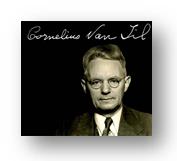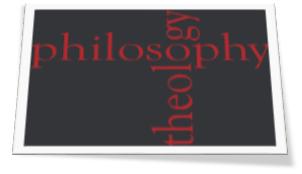Apologetics and Cornelius Van Til
Apologetics and Cornelius Van Til
Some weeks ago a written request was received from British Columbia to address the question of apologetics and the teachings of Dr. Cornelius Van Til. As even a superficial treatment of Van Til's thought and apologetics would extend beyond the perimetry of our "questions answered" department, I have thought it best to devote a separate editorial to this subject. At best, however, I can only touch on Van Til's background, basic thinking, and a capsule summary of apologetics and its various methodologies in the scope of one brief article.
 Presently, Dr. Van Til is emeritus professor of Westminster Theological Seminary in Philadelphia. Privileged to commemorate his 90th birthday a few weeks ago, Dr. Van Til has a lengthy and influential teaching career behind him. From the opening of Westminster Seminary in 1929 until his emeritation in 1976, Dr. Van Til taught apologetics and related courses from a uniquely biblical perspective, all the while exerting a steadily growing influence on many graduate students and religious thinkers, both American and foreign.
Presently, Dr. Van Til is emeritus professor of Westminster Theological Seminary in Philadelphia. Privileged to commemorate his 90th birthday a few weeks ago, Dr. Van Til has a lengthy and influential teaching career behind him. From the opening of Westminster Seminary in 1929 until his emeritation in 1976, Dr. Van Til taught apologetics and related courses from a uniquely biblical perspective, all the while exerting a steadily growing influence on many graduate students and religious thinkers, both American and foreign.
Cornelius Van Til was born on May 3, 1895 at Grootegast, in the province of Groningen, the Netherlands, as the sixth son of godly, Bible-centered parents. Raised in a "lovingly strict" Calvinistic home, the three forms of unity were from early on formative influences on Van Til and his interpretation of Scripture. In 1905 the Van Til family emigrated to Highland, Indiana, to engage in farming in a more prosperous area. As a teenager, young Van Til felt the weighty call of the ministry placed upon him by God. After a short period of study at Calvin College, he was drawn to Princeton Seminary where he remained a student for five years (1922-27), prior to obtaining his doctorate in philosophy with a dissertation entitled, "God and the Absolute." Throughout these years Van Til studied under an impressive array of leading Reformed thinkers at Princeton, such as Geerhardus Vos, Caspar W. Hodge, William P. Armstrong, Robert D. Wilson, Oswald T. Allis and J. Gresham Machen.
The 20s proved to be a time of crisis for the once staunchly Reformed seminary at Princeton. The tradition of Archibald Alexander, Charles and A.A. Hodge, and Benjamin B. Warfield was increasingly being challenged by the infiltration of more liberal-minded professors. After a brief pastorate at Spring Lake Church, Muskegon, Michigan, Van Til taught for one year at Princeton, prior to resigning with Dr. Machen when Princeton was reorganized in 1929. Subsequently, he returned to Spring Lake, being determined to refuse teaching at either Princeton or the newly organized Westminster Seminary which aimed to carry on the tradition of "old" Princeton under the able leadership of Dr. Machen. Nevertheless, he was prevailed upon to join the Westminster faculty by Drs. Machen and Allis who traveled to Michigan to seek his and R.B. Kuiper's services. For 47 years Dr. Van Til taught at Westminster Seminary, influencing scores of students in the realm of Reformed theology, philosophy, and particularly, apologetics.
 Two fields of study, distinguishable and yet closely related, have molded the person and work of Cornelius Van Til under God's providential hand: theology and philosophy. Theologically, Van Til's contours have always been and remain unequivocally Reformed in principle and practice. Beyond a doubt, John Calvin, upon whose spiritual manna Van Til has been nurtured all his life, was his first and foremost theological influence, Scripture excepted. Secondly, the teachings of the Heidelberg Catechism via his Dutch Reformed upbringing and of the Westminster Confession of Faith and Catechisms, due to connections with orthodox presbyterianism at Old Princeton and Westminster seminaries, have cast their dye on the theological mind-set of Van Til. Thirdly, the background of Van Til's theological convictions were self-admittedly influenced by the Kuyperian and Bavinck line of thought. Though Van Til rejected Kuyperian presumptive regeneration, he did embrace a number of Kuyper's significant theological principles, such as the centrality of the absolute sovereignty of God over all creation; the focus of all life's strands drawn to the heart of man as the center of his existence and relationship to God; the conviction that all of life is consequently religious and is acted out in either a Godward or anti-Godward direction; and the commanded pursuit of Christian philosophy in every subject area by examining its created order, dysfunction through sin and fall, and post-lapsarian restoration in Christ. Though Van Til often sought to rework and go beyond both Kuyper and Bavinck, the Kuyper/Bavinck line of thought which claimed the principal thesis that "the Christianity set forth in the Bible is the one God-revealed religion, and that Calvinism is the clearest and most consistent expression of that religion – both in content and in its life-and-world presentation," he accepted unmitigatingly all his life (cf. William White, Jr., Van Til: Defender of the Faith, p. 35; White's account, an authorized biography, contains the most detailed information available to date on Van Til's life).
Two fields of study, distinguishable and yet closely related, have molded the person and work of Cornelius Van Til under God's providential hand: theology and philosophy. Theologically, Van Til's contours have always been and remain unequivocally Reformed in principle and practice. Beyond a doubt, John Calvin, upon whose spiritual manna Van Til has been nurtured all his life, was his first and foremost theological influence, Scripture excepted. Secondly, the teachings of the Heidelberg Catechism via his Dutch Reformed upbringing and of the Westminster Confession of Faith and Catechisms, due to connections with orthodox presbyterianism at Old Princeton and Westminster seminaries, have cast their dye on the theological mind-set of Van Til. Thirdly, the background of Van Til's theological convictions were self-admittedly influenced by the Kuyperian and Bavinck line of thought. Though Van Til rejected Kuyperian presumptive regeneration, he did embrace a number of Kuyper's significant theological principles, such as the centrality of the absolute sovereignty of God over all creation; the focus of all life's strands drawn to the heart of man as the center of his existence and relationship to God; the conviction that all of life is consequently religious and is acted out in either a Godward or anti-Godward direction; and the commanded pursuit of Christian philosophy in every subject area by examining its created order, dysfunction through sin and fall, and post-lapsarian restoration in Christ. Though Van Til often sought to rework and go beyond both Kuyper and Bavinck, the Kuyper/Bavinck line of thought which claimed the principal thesis that "the Christianity set forth in the Bible is the one God-revealed religion, and that Calvinism is the clearest and most consistent expression of that religion – both in content and in its life-and-world presentation," he accepted unmitigatingly all his life (cf. William White, Jr., Van Til: Defender of the Faith, p. 35; White's account, an authorized biography, contains the most detailed information available to date on Van Til's life).
Philosophically, Kuyper's Calvinistic principles made a major impact on the school of philosophic thought denominated "Amsterdam Philosophy" or "Calvinistic Philosophy," which, in turn, influenced Van Til, particularly in his early Westminster years. Developed in the second quarter of this century, "Calvinistic Philosophy" grew out of the writings and teachings of Herman Dooyeweerd (1894-1977) and Dirk Hendrik Theodore Vollenhoven (1892-1978), brothers-in-law who were simultaneously appointed to the chairs of jurisprudence and philosophy respectively in 1926 at the Free University of Amsterdam. Dooyeweerd has posited the following four ground-motives as functional throughout the course of history: firstly, the form-matter dualism in Greek philosophy; secondly, the nature-grace synthesis in medieval philosophy; thirdly, the nature-freedom dualism in modern philosophy; finally, the truly Christian ground-motive based on the radical, biblical motif of "creation, fall, and redemption through Jesus Christ in the communion of the Holy Spirit." (Cf. Herman Dooyeweerd, In the Twilight of Western Thought: Studies in the Pretended Autonomy of Philosophical Thought, pp. 39-52). For Dooyeweerd, only this fourth ground-motive can function in Christian philosophy; consequently, he seeks to build his philosophical system, denominated "The Philosophy of the Idea of Law" or "Cosmonomic Idea" after one of his early major works, De Wijsbegeerte der Wetsidee, on the basis of the creation-fall-redemption ground-motive.
In the last two decades, however, Van Til has become critical of some aspects of the Amsterdam philosophy, despite his indebtedness to it. In particular, he has criticized Dooyeweerd for moving away from a radically Christian and Calvinistic philosophy to an approach that allows more accommodation to, or at least more congenial dialogue with, non-Christian thinking. (Cf. Edward R. Geehan, Jerusalem and Athens, where Dooyeweerd and Van Til engage in a lengthy interchange relative to their differences.)
Nevertheless, there are salient points of Kuyperian thought which have directly affected Dooyeweerd, Vollenhoven, and Van Til in greater or lesser measure. Among others, these include the following: science is dependent on philosophical considerations and underlying principles to function rightly; to obtain a sense of totality in science or theology, a philosophical starting point is necessary, derived by spiraling down to the depths of any given; non-Christian philosophy can have no point of transcendence, but must essentially remain within the cosmos; faith and thought operate always as functions moving either in a right or wrong direction; logic must not be elevated in philosophical thinking.
Against this background, Van Til developed his "new apologetic," in which he defends "old truth." Though he was preeminently a preacher of the Word of God, to which also his work in apologetics was subordinate, Van Til has nevertheless become known primarily through his pioneer work in the field of apologetics (cf. Dr. E. Clowney, Westminster Theological Journal, fall 1984; John H. Piersma, Outlook 35, 5 [1985]:16-17). Rightly, he has been called "old guardian of a new apologetics" (Paul C. H. Szto, Outlook, 35, 5 [1985]:12-13).
But just what is apologetics? Apologetics has been defined as a branch of scientific theology which deals with the history and possibility of efforts to establish an effective defense of the Christian faith against any attack from those outside that faith. As a subdivision of Christian theology, apologetics is a systematic, argumentative discourse in defense of the divine origin and the authority of the Christian faith. Van Til himself has defined it as "the vindication of the Christian philosophy of life against the various forms of the non-Christian philosophy of life" (Apologetics, p. 1).
 The English word, apologetics, is derived from a Greek root meaning "to defend, to make reply, to give an answer, to legally defend oneself." In New Testament times, an apologia was a formal courtroom defense of something (2 Tim. 4:16). The Greek verb (apologeomai) occurs ten times in the New Testament, and the Greek noun (apologia) occurs eight times. In nearly every case, the key element involved is that of defense. This coincides with Van Til's major work on apologetics, which is aptly titled, Defense of the Faith.
The English word, apologetics, is derived from a Greek root meaning "to defend, to make reply, to give an answer, to legally defend oneself." In New Testament times, an apologia was a formal courtroom defense of something (2 Tim. 4:16). The Greek verb (apologeomai) occurs ten times in the New Testament, and the Greek noun (apologia) occurs eight times. In nearly every case, the key element involved is that of defense. This coincides with Van Til's major work on apologetics, which is aptly titled, Defense of the Faith.
Hence, the notion of some well-intentioned believers that they are under no obligation to propound and defend their faith before a hostile world is clearly not supported by Scripture. Besides the obvious fact that by example both Jesus and Paul repeatedly defended their claims respectively of Messiah (Matt. 22) and apostle (Gal. 1, 2; 1 Cor. 9; Acts 22-26), the classic Petrine admonition certainly implies that the Christian faith is capable of reasonable defense: "Be ready always to give an answer (i.e., a defense) to every man that asketh you a reason of the hope that is in you with meekness and fear" (1 Pet. 3:15b).
Though the Scriptural mandate is clear that the Christian faith must be defended, that is, that apologetics is a significant and commanded task, how the method of apologetics ought to be carried out has often been and still remains a matter of intense debate. At least three different major schools of thought have emerged in addressing the "how" of Christian apologetics.
First, there is the school of revelation or presuppositionalism. This school has as its motto: Credo ut intelligam ("I believe in order that I may understand"). It presupposes the supernatural revelation of God's Word as providing the only base for the entire theological enterprise. Dr. Reymond succinctly states: "Group characteristics here are convictions that (1) faith in God precedes understanding everything else (cf. Hebrews 11:3), (2) elucidation of the system (of truth) follows faith, (3) religious experience must be grounded in the objective Word of God and the objective work of Christ, (4) human depravity has rendered autonomous reason incapable of satisfactorily anchoring its truth claims to anything objectively certain, and (5) a special regenerating act of the Holy Spirit is indispensable for Christian faith and enlightenment" (Robert L. Reymond, The Justification of Knowledge: An Introductory Study in Christian Apologetic Methodology, p. 8). This camp is represented by the Augustinian and consistent Reformed tradition – Van Til inclusive. Van Til's role has been one of developing presuppositionalism along Reformed lines beyond any before him.
Second, there is the objective school or evidentialism, which may be represented by the motto, Intelligo et credo ("I understand and I believe"). Methodology in this school stresses some form of natural theology as the point at which apologetics commences. As Reymond sums, "Group characteristics here are the following: (1) a genuine belief in the ability and trustworthiness of human reason in its search for religious knowledge, (2) the effort to ground faith upon empirical and/or historically verifiable facts, and (3) the conviction that religious propositions must be subjected to the same kind of verification – namely, demonstration – that scientific assertions must undergo. The Thomistic Roman Catholic tradition, the (inconsistent) Reformed evidentialist traditions, and the Arminian tradition are representative of this group" (p. 9).
Van Til has done much pioneer work in exposing the fallacies of this methodology. Rightly, he has shown that the problem with this approach is that it neglects the radical effects of the fall of man, for it advocates that reason was only weakened but not crippled by the fall. Van Til has consistently attacked two of its major proponents, Thomas Aquinas the major, medieval Roman Catholic theologian, and Bishop Butler – an eighteenth century Anglican. Aquinas sought for a common ground between philosophy and religion by insisting that God's existence could be demonstrated by reason but was also revealed in the Scriptures. His aim was to synthesize both natural and supernatural thought, both Christian and pagan thought, that is, to merge Augustinianism and Aristotelianism. Van Til has shown biblically how that the Thomistic approach of going part way with the natural man and then leading him to supernatural truth, undermines the whole biblical structure of one system of truth. In a parallel fashion, Van Til has exposed the fallacy of an Anglican's work, Bishop Butler, Analogy of Religion (1736), for arguing the truth of Christianity on the grounds of "mere probability."
Thirdly, there is an apologetic denominated as subjective methodology or experientialism. Its motto is: Credo quia absurdum est ("I believe because it is absurd").  This school of thought stresses inward religious experience as the foundation of all theology. This tradition accents the paradoxical character of Christian teaching to the point that it asserts that Christian truth is not capable of rational analysis. Typical of this school is the Barthian tradition, which underscores the "otherness," the transcendence, and hiddenness of God at the expense of His concrete scriptural revelation of truth. Van Til has also done extensive work in exposing the fallacy of Barth, Barthians, and others who espouse experientialism as independent of, or superior to, the objective character and authority of Scripture for establishing truth.
This school of thought stresses inward religious experience as the foundation of all theology. This tradition accents the paradoxical character of Christian teaching to the point that it asserts that Christian truth is not capable of rational analysis. Typical of this school is the Barthian tradition, which underscores the "otherness," the transcendence, and hiddenness of God at the expense of His concrete scriptural revelation of truth. Van Til has also done extensive work in exposing the fallacy of Barth, Barthians, and others who espouse experientialism as independent of, or superior to, the objective character and authority of Scripture for establishing truth.
In sum, Van Til has played a major role in uncovering non-presuppositional methods or attitudes in both non-Reformed and also in otherwise Reformed thinkers – particularly in the Old Princeton apologetic as advocated by Warfield, et al. He has even detected signs of inconsistency in this regard in Kuyper and Bavinck. In short, Van Til has done able work in presenting a thoroughly consistent and biblical Reformed apologetic, and has been used mightily by God in purging Reformed theology from non-Reformed apologetics. He has also provided a Reformed foundation for Christian ontology, epistemology, ethics, as well as theology. There is much for us to learn from Dr. Van Til, and we cannot recommend too highly his Defense of the Faith, and his Introduction to Systematic Theology for those who are serious about understanding Scripture and advancing in the knowledge and understanding of truth.

Add new comment